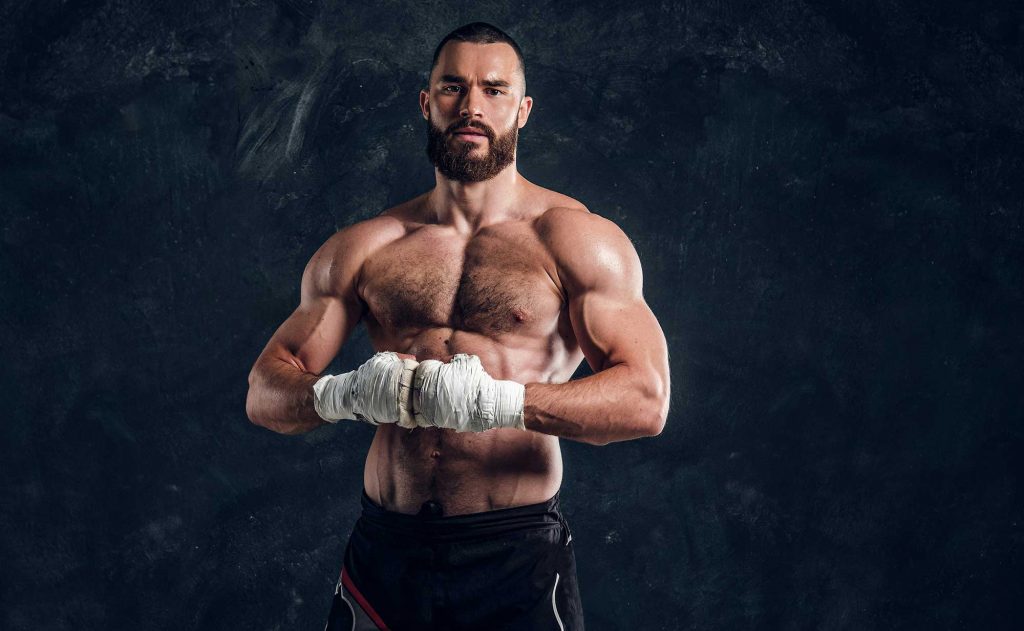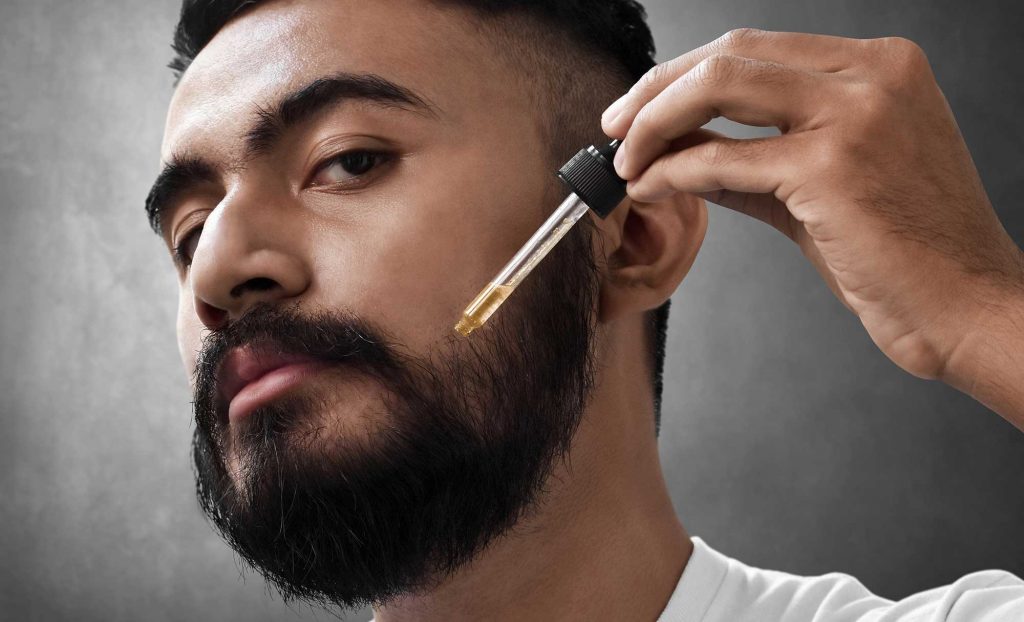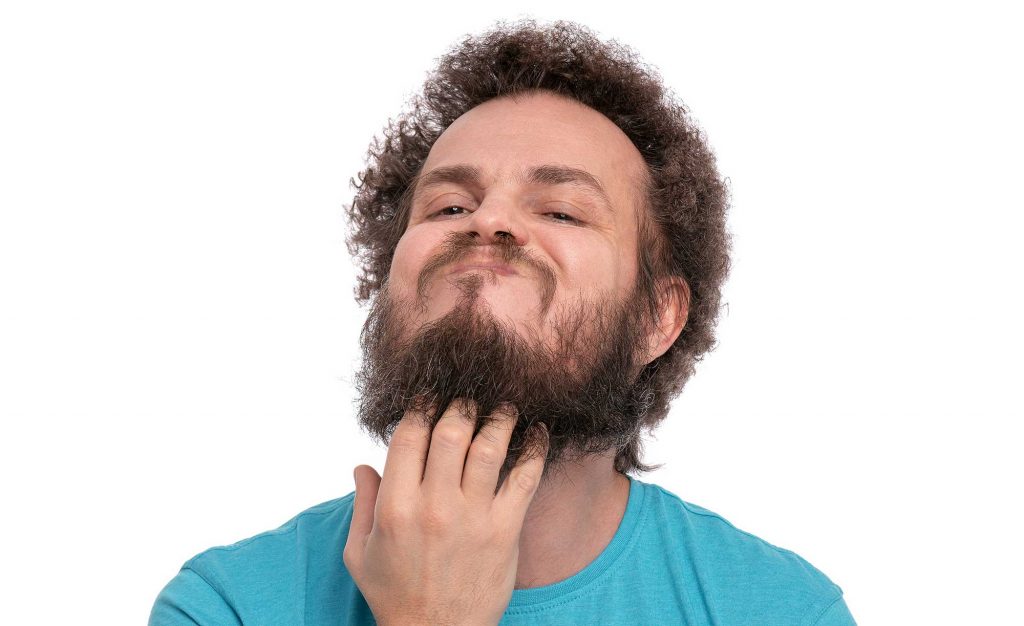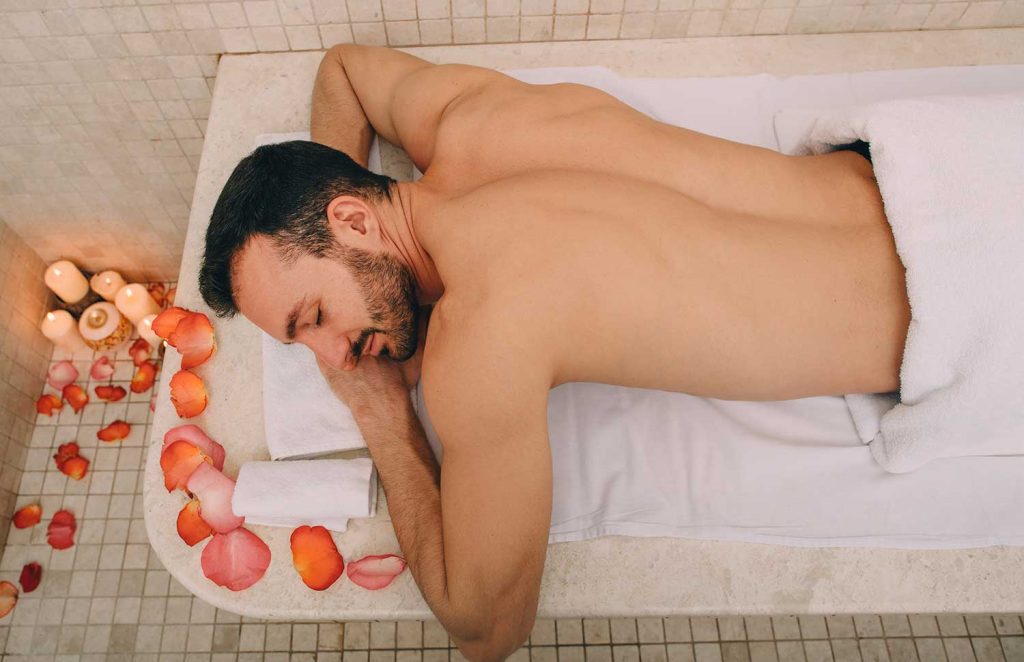How Long it Takes to Grow a Beard & How to Speed it Up

We’ve all been there:
You’ve decided to take the plunge and grow a beard, and you’re excited to get styling.
The only problem is, it isn’t quite happening the way you’d imagine, and everybody you know has a different answer as to what you should do and how long it’s going to take.
But these days, we have genuine science to answer those questions for us – there really needn’t be any problem.
Growing a beard can be frustrating and challenging, but it at least doesn’t have to be confusing.
So how long does it take to grow a beard?
Well, the simple answer is this:
Beards generally require two to four months of uninterrupted growth to appear ‘full,’ but the speed, thickness, and overall quality of the beard varies greatly from man to man.
As a rule, most men can expect to have at least something to work with within a few weeks and should appear fully bearded within six months.
If, at that point, you are still having trouble seeing results, it may be time to think about some of the interventions we’re going to discuss in this article.
To some of you, this will be shocking:
The truth is, there are many aspects that impact the speed of facial hair growth, and claims about the ‘average time to grow a beard’ are misleading.
And of course, it’s important to remember that not every man can grow a beard naturally and might require a transplant.
The good news is there is lots you can do to overcome whatever limitations you happen to have, and we’re going to go into plenty of detail about them in this article.
We’re going to explore in-depth the various factors – from genetics and hormones to nutrition and mental health – which dictate how quickly and nicely your beard grows, as well as offering some key advice as to how you can improve that growth.
But first, it’s important we all understand exactly why and how facial hair grows to begin with…
Why do we grow beards?
The answer to that questions isn’t as straightforward as you might think.
In the past, men grew beards for practical reasons. They provided protection against extreme cold and sunburns and offered a natural means of camouflage.
But these days, growing a beard is more about fashion than function.
To most men, facial hair is an expression of masculinity. So it’s no surprise that 85% of men are trying to grow facial hair at any given time.
There are several different ways to look at this:
First, we need to understand why on earth, men would have evolved to grow facial hair at all.
What are beards good for?
The best theories suggest that it has many roots: signaling masculinity and helping attract women, protecting the skin from UV rays, and distinguishing a man from his competitors all have merit.
Studies, for example, have suggested that men with beards are perceived as older, stronger, and more aggressive than their clean-shaven peers.
And interestingly, one historical study suggests that men are more likely to grow a beard when they are single and have a larger pool of other men to compete with for mates.
While we can never know for sure, we can say for certain today that having a beard has a bunch of benefits, from making you more attractive to helping balance out a balding head.
With that cleared up, we need to understand how beards actually grow biologically.
How does our body produce a beard?
Fundamentally, the answer is through a sex hormone called Dihydrotestosterone (DHT), which is produced from testosterone – explaining why most men grow beards, whereas very few women tend to.
DHT contributes to hair growth, muscle gain, fertility, and a bunch more besides – in fact, around 10% of our testosterone ends up being converted into DHT.
Basically, DHT circulates through your body, attaching to various receptors; when it attaches to the hair follicles on your jaw, it stimulates growth.
Thus begins the growth cycle of your hair…
The 3 phases of facial hair growth
Hair all over your body goes through a basic growth cycle of between 2 and 6 years – even if you shave or cut your hair, the same hair grows back from the same root.
When the cycle finally needs, the hair enters its ‘resting phase’, before finally falling out; this is why beards are found to rarely (if ever!) grow beyond 6 years of full growth.
The beard’s growth cycle can be split into three distinct phases:
The Anagen phase
This is the ‘growth’ phase, where the hair is doing most of its most obvious sprouting. It tends to last between a few months and a year or two, with different factors affecting how fast and full the growth turns out to be.
As we’ll see, how your genes have programmed the protein production to how much testosterone there is in your system will alter the growth speed.
The key fact is that facial hair rarely grows more than a half-inch each month during this phase, and can vary wildly within that scope.
The Catagen phase
The next phase is a bit dull, to be honest. Not a helluva lot happens; the hair strands separate from the hair follicles, and the blood supply to the hair’s roots stops, too.
This is basically a transitional period, generally lasting for a few months.
The Telogen phase
Finally, the telogen phase is the beginning of the end: the hairs slowly begin falling out, and the follicles start to return to the anagen phase, ready to start anew.
This is perfectly natural, and while some men start to freak out as they notice their precious beard hairs waning, you must remember this is the natural cycle, and it will all start again soon!
So now that we understand exactly how your hair grows and what you should expect let’s dive into some of the key factors which contribute to the speed and quality of that growth…
What affects how my beard grows?
Age
The first thing to note is that age plays a big role in beard growth: between 12-16, boys’ bodies are still developing DHT, and therefore they tend to slowly develop a bit of facial fluff here, an embarrassing mustache there.
As you get to around 25, your ability to grow a beard will be at its strongest, and the next 10 years or so will likely be your most fluid and natural growth; this is because your body is increasing its testosterone production and therefore extending the anagen period.
After 35, the growth can slow somewhat, though that isn’t always the case, and it tends to taper very, very slowly.
The key point to note here is simply that age is a major factor, and if you’re in your early 20s, you should not be discouraged if you’re taking a little to get things going.
Genetics
Next up is your genes: of course, everything your body does is, in large part, dictated by your genetic code, and beard growth is no different.
Simply put, DNA produces RNA, which produces the proteins which make up your body and tell it how to function; somewhere within your genetic makeup will be instructions about how hair should be produced and how urgently, as well as things like the color and thickness of your hair.
This is why you so often hear about ‘male pattern baldness,’ and people in the same family often have similar looking hair.
But it’s also important to remember that DNA is not destiny, and there are plenty of ways to overcome an unfortunate hand in this department.
Nutrition
There are two key factors here: first, the nutrients your body has to work with determine how long it stays in the anagen phase for – and therefore, long and fast the hair grows.
However, there is also the matter of your beard’s quality: if you don’t have the correct nutrients – in particular Biotin – your facial hair won’t grow as strong or healthy.
Another thing to consider is the health of the follicles and skin, both of which need a variety of vitamins and minerals – vitamins A, B, C, and E are particularly important, as well as monounsaturated fats such as you get from daily products and olive oil.
Sleep
Directly linked to nutrition and the overall healthy functioning of your body, how much and how well you sleep have a surprising effect on your beard growth.
A large part of this is the effect sleep has on blood circulation – if your blood can’t flow properly between parts of your body, your hair simply won’t grow healthily.
Ideally, you’ll get between 8-9 hours of good quality sleep each night, and this will also go a long way to help the detrimental effects of stress.
Stress
Stress is a serious problem across Western countries and the world at large, and it has a number of seriously nasty side effects.
While stress is a natural and important part of life – for example, it helps your body know when it’s in danger.
One of the side effects of undue stress, however, is the depletion of your immune system, which is terrible for hair growth.
If you are regularly stressed, you can expect your beard to grow less quickly as well as more frequent bouts of hair loss from it.
Exercise
As you are likely starting to see, the overall health of your body is directly related to how your beard grows – which shouldn’t really come as a shock when you think about it.
It does, however, mean that exercise is another important factor in your beard’s growth.
In part, this is because it improves your blood circulation, keeps your immune system in check, and overall promotes healthy bodily functioning.
However, working out – particularly lifting weights – is also strongly linked with our final factor – testosterone.
Hormones
Given the role DHT plays in beard growth, you should expect that the hormonal balance of your body has a major impact on beard growth.
How much testosterone is in your body is in part genetic – some men are just born with a higher level of testosterone, and there’s nothing inherently good or bad about that.
But it’s also in part environmental, and as we’ve seen already, there are ways you can increase the amount of testosterone in your system without necessarily directly increasing it.
5 Mistakes that slow down your beard growth
Now that we’re clear on how and why your beard grows, it’s time to look at 5 simple ways you can improve it.
But before we can do that, we need to address a few mistakes we see made constantly, which are actively sabotaging your ability to grow a health beard quickly:
1. Impatience
We get it: it takes longer than you’d like.
It’s perfectly natural to get a little irritated with the process, particularly if you’re on the slower end of the spectrum or you’re having trouble with the itches and general upkeep.
But the reality is, this is a long-haul deal, and you need to be dedicated and willing to invest real time and effort into building up a proper beard.
Now that you understand what your body is doing and how the anagen phase works, hopefully, this will be less of a problem.
But if it still is, just try to keep your eyes on the prize and remember what it is you’re working towards:
2. Buying into myths
There are so many articles and gurus out there who are, frankly, peddling garbage.
They’ll tell you it should take exactly this long to grow a full beard, or you have to use that product if you want a proper Thor-like beard.
And the reality is, most of this is just a way of trying to either sell you stuff or make you like them.
The ultimate result is almost always either wasted time or getting disheartened and ultimately giving up.
Don’t listen to anyone who claims they know exactly how this stuff is done – everybody is different, and if you’re struggling, there’s every chance you just haven’t found the solution you need yet.
3. Smoking
This is, of course, a fairly general mistake, but smoking is also known to damage your hair’s quality and cause hair loss and potential baldness.
It can be hard, of course, but if you’re trying to grow a beard while smoking and are struggling, this might be the perfect opportunity to finally give it up and put down the smokes.
4. Poor skincare
As we’ve discussed, the health of your skin – its moisture levels, for example – affect how well your beard can grow.
If you’re putting lots of effort into growing a beard but not also taking care of the skin beneath it, you may have to realize that these two things can’t work separately.
Not only is not taking proper care of your skin likely to stifle your beard’s growth, but it is also likely to make the hairs themselves less healthy and less attractive – so stop overlooking it!
5. Not grooming it
Many men seem to think they need to wait until they’ve grown a full, luscious beard before they start looking after it properly.
But the reality is, looking after it properly is part of what makes it grow healthily and encourages faster growth in the first place.
From using beard oil to brushing the thing, there are many ways in which you can look after your beard even during the very early anagen phase – and the results are basically always far, far better.
5 Ways to speed up your beard growth
We understand the frustration of a slow-growing beard and the frustration of not knowing why you can’t seem to get that mane to look how you want.
But it’s far more in your control than you might think, and these are just a few of the ways you can influence it:
1. Take supplements
There are many supplements out there that will help you improve your nutrition and make sure your body has exactly what it needs to grow a beard as fast as humanly possible.
For example, Biotin supplements will absolutely help improve your hair growth and ensure your follicles have everything they need to grow.
But there are also more exotic and specialist things you can use:
If you’re really struggling to get the growth you need, you could even try something like Minoxidil, which has been scientifically proven to stimulate growth.
2. Change your diet
As simple as it sounds, just changing your diet can have a radical impact on the speed at which your beard grows.
For example, foods like fish, chicken, tofu, eggs, yogurt, salmon, nuts, and many others will give you extra protein, as well as a whole host of the vitamins and minerals we discussed above.
The goals should be not simply to improve your beard growth, but to improve your health overall – it will make you feel much better, and it will be the perfect companion to an improved exercise regime.
3. Exercise
Once again, this really ought to be general advice: exercise is for healthy bodily function, regardless of whether you’re growing a beard or not.
However, increasing the amount you exercise – in particular, lifting weights – will increase the amount of testosterone in your system by a great deal, which will have a knock-on effect on your beard.
4. Use beard oil
While using beard oil won’t in-of-itself increase the speed your beard grows at; it will create a much better environment for it to grow in, which in turn will increase the speed of growth.
By keeping the hairs, you have healthy – as well as the skin below them! – using beard oil can be the difference between a healthy-looking beard:
And one which is decidedly less so:
5. Relax
Finally, and in some senses, most importantly, you’ve just got to relax.
It will help you avoid stress and sleep better, but it will also improve your general quality of life and make the whole process of growing a beard – which we acknowledge can be difficult at first – far more pleasant.
You’ll be far less likely to get impatient and give up, and ultimately it’ll mean you take yourself much less seriously, which can only be a good thing.
From meditation and yoga to downing a smoothie or lighting a good scented candle, there are tons of great ways to relax.
So just take the time to experiment and find exactly what it is, which most chills you out.
As we’ve seen, there are numerous different factors at play, determining how long it takes for you to grow facial hair.
But it’s also worth pointing out that many of these factors are interrelated – that is, they impact each other.
If you work out more, you’ll have more testosterone. But then, having more testosterone is likely to make you want to work out more.
The point is, encouraging faster and better beard growth is often about creating positive cycles and embracing several different methods at once:
Rather than just focusing on diet or supplements, you need to also be exercising, avoiding negative habits, and maybe even using oils to encourage growth.
Conclusion
So there we have it:
Hopefully, we’ve helped demystify the whole process of how beards grow and what is causing yours to grow the way it can.
We’d love to hear about your experiences and what you do to help your beard grow more healthily and quickly.
Do you enjoy growing a beard? Is it difficult or frustrating? How have our tips affected your ability to grow it quickly?
Please let us know in the comments below.







27 Comments
well I don,t smoke so I wouldn,t know
I’ve been growing my beard for about 11 months now without trimming it, I think I hit the genetics lottery, cause both my oldest boys say it’s like Willie Robertson’s from duck dynasty but longer.
i have been using eucalyptus oil on my face for over a week now but there is no improvement in my beard growth. I am just 15 years old and criving for a beard. anything that will boost my beard growth to grow in a month.
Check out our guide on how to grow a thicker beard.
I would like a beard but it won,t grow yet
If you are 15 then chances are it is merely bum fluff anyway. Keep shaving until you’re a bit older.
I have mustache and hair on my chin for almost a couple of months, if i won’t shave it let’s say a year is it possible i can achieve a full grown beard ?
Hard to tell without any pictures.
beard makes me look like a criminal …
sorry police always arrest me with a beard
my eyebrows also are 9 inches long…
am I ok ?
I would see a doctor.
You’re hilarious but I don’t think you’re trying to be
but what if a doctor can,t do anything
well shave it off then
Ivb Grown my beard for about 6 years. With occasional trimming. But weekly shape ups . when I comb my beard I usually get about 7… 10 Hairs come out. Have I reached my full potential? It’s roughly 3 inches on my chin . I keep the cheeks more tamed
m worried if anything happens to my skin and facial hair too
can i use beard oil on my eyebrows and eyelashes plz plz reply soon
Eyebrows, yes sure. Eyelashes, I don’t think that would be a good idea.
no because if you use it on your eye brows it will be more likely that it well get sore so my advice is always check the instructions before you use it Ive never used it so I would n,t know really but like I said always check the instructions
I grew a beard twice for six weeks but I had to shave it off each time due to devastating itch.
Then I learned emotional freedom technique where you tap acupuncture points and the itch totally disappeared
Been growing mine for well over 6 months now without cutting or trimming it. Still have patches on my cheeks tho its frustrating. Do i just leave for a whole year then? what beard oil would you recommend?
I say go for the Yeard, John. You can read all about the best beard oils right here.
Very good.
I’m growing my beard again after using wrong settings on beard trimmer but hasn’t taken long to grow through again. Want a short but full on beard how long will it take to progress?
At least 4 weeks if you have a decent amount of facial hair.
Just a quick question I need clarification on, when you say smoking do you mean strictly tobacco or both tobacco and cannabis?
Tobacco.
Excellent.